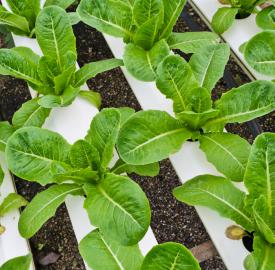Posted: November 25th, 2013 | Author: jimmurray | Filed under: Energy Conservation, environmental challenges, Green Businesses, Green Home, Green Technology | Tags: conservation, heating system filters, insultaton, Tags: Green, winter | No Comments »
This is a guest post by Ken Myers. Thanks Ken.
 Air conditioning in the summer can easily drive the electric bill to high levels. However, winter can easily surpass the energy used to keep yourself warm. Unlike the summer, the cold of winter can be relentless and has fewer ways you can adapt. If you want a method to determine how efficient your energy use is, the winter months are where you could set the bar.
Air conditioning in the summer can easily drive the electric bill to high levels. However, winter can easily surpass the energy used to keep yourself warm. Unlike the summer, the cold of winter can be relentless and has fewer ways you can adapt. If you want a method to determine how efficient your energy use is, the winter months are where you could set the bar.
Gas and Electricity Used in Conjunction
In order to produce cold air during the summer, homes and offices will utilize pure electricity to drive appliances. While some homes may rely on a completely electrical heating system for the winter, many more rely on burning gas for heat and then electricity to divert the warm air to various locations around the establishment. In this instance, gas and electricity are used as an energy source to provide that warmth.
Preventing Heat from Escaping
During the winter, the heat can escape the home or office through various means. This could include everything from windows to even the walls themselves. Insulation doesn’t just keep the cold air out, but it’s supposed to help keep the warm air in. What are some items to look at in your home or office?
- Windows: Having double-paned windows is a good way to keep more of the heat in and cold out. If you’re unable to install such, covering the windows with cardboard or other covering can help keep heat in. When the Sun is shining, open these coverings to allow the sunlight to heat up your home or office.
- Doors: Not having a proper seal around your door frames can easily cause problems for efficiency. Cold air can enter while warm air exits. Make sure you have a tight seal on your doors using self-adhesive weather stripping and properly fitted door jams and thresholds.
- Inadequate Insulation: Not having proper insulation can also be detrimental. If you are unable to check how well your insulation covers your walls and ceiling, there are radiant thermal barrier paint additives you can coat them with to add an additional layer of insulation.
Filters
Keeping the filters clean on your heating system is another way to increase your efficiency that many people overlook. When dust collects onto the filters, it restricts the flow of air that furnaces use to heat the area of a room or office space. Without this airflow, the heating system will continue to waste resources in an attempt to increase the temperature of the room according to the thermostat. A clean filter will allow the air to pass through allowing the system to work as intended and heat the facility or house quicker.
Winter can be extremely harsh on both you and your pocketbook. By going around your home or office, you can easily tell where weak areas are for heating efficiency from feeling the temperature. For rooms that are not used that often, keep the door closed in order to reduce the need for heat. If these rooms are near your thermostat, they could cause your heater to kick on even if no one is using them.
Author Bio:
Ken holds a master’s in business leadership from Upper Iowa University and multiple bachelor degrees from Grand View College. As president of morningsidenannies.com, Ken’s focus is helping Houston-based parents find the right childcare provider for their family. When he isn’t working, he enjoys spending time with his three children and his wife.
Guest Bloggers Welcome
If you have an idea for a green blog post, email me at jim.murray@ourgreendirectory.com and I will send you the submission critieria.
Posted: November 18th, 2013 | Author: jimmurray | Filed under: Aquaponics, Green Businesses, Green Initiatives, Green Technology, Our Green Directory | Tags: aquaponics, eco system, nitrates, plants | No Comments »
This is a guest post from blogger, bAmanda Kostina.
 Aquaponics is the combination of aquaculture and hydroponics. The former concerns the raising of aquatic animals, while the later deals with growing plants or vegetables in water. By combining the two, aquaponics creates a mutually beneficial system where water and nutrients are recycled naturally. By feeding the waste water from an aquaculture system into a hydroponics system, essential nitrates and nitrites are created in a natural way. This leaves a clean, healthy environment for the fish, while providing nutrients for the plants. In this list, you will find ten more excellent reasons why you should consider a aquaponics system.
Aquaponics is the combination of aquaculture and hydroponics. The former concerns the raising of aquatic animals, while the later deals with growing plants or vegetables in water. By combining the two, aquaponics creates a mutually beneficial system where water and nutrients are recycled naturally. By feeding the waste water from an aquaculture system into a hydroponics system, essential nitrates and nitrites are created in a natural way. This leaves a clean, healthy environment for the fish, while providing nutrients for the plants. In this list, you will find ten more excellent reasons why you should consider a aquaponics system.
- Weeding – With aquaponics, it’s simply not an issue. The systems don’t use soil or any processes that enable weeds. Without weeds, you can concentrate on growing vegetables and watching your fish grow. That means that you can say goodbye to that lower back-pain from constantly having to bend down to pull out weeds.
- Reduced Space – In aquaponics systems, plants and vegetables are constantly fed through water and nutrients. This means that the footprint needed is significantly less than with traditional crop farming. As long as each plant is getting enough light, you can effectively grow plants in much closer quarters.
- Artificial fertilizer – Forget about ever having to buy artificial fertilizer once you set up an aquaponic system. The only additional food that your plants will need is supplements to balance nutritional intake. However, not all systems will require an additional supplement, which means 100% savings on fertilizers. Most important of all is the fact that you can’t actual add fertilizer to the system, as it will kill any fish you have in the tank.
- Faster Plant Growth – With a constant feed of essential nitrates, plants grow much faster in aquaponics systems. The level of output is also affected by the reduction in space, allowing the system to produce higher yields than traditional soil planting. Also, aquaponics systems are improving all the time, which can only mean that even faster plant growth will be possible in the future.
- Water Reduction – All water in aquaponics systems is recycled. This means that your overall water usage will greatly reduced, which is good for both the environment and your pocket. There is little to no labor involved in the process, either. Apart from occasional top-ups and cleaning pumps and filters, you won’t have to lift a finger to maintain optimum water levels.
- Organic Systems – Provided that you give your fish stock only organic feed, an aquaponics system is completely eco-friendly. You will benefit from only the most natural crops and plants, while your fish are fed on healthy organic products, too. This is a win-win for humans, plants and fish. You can’t always guarantee that store bought vegetables are organic, but you can with your own aquaponics system.
- Sustainability – As your aquaponics system is effectively a self-sustaining ecosystem, you don’t have to worry about eroding resources. Once you determine the best level of production, you can maintain growth and output at a constant level. Soil systems, on the other hand, drain their ecosystem of resources, requiring you to constantly re-balance nutrients and the soil’s health.
- No Pesticides – With soil, you have to use pesticides to prevent plants from becoming damaged or destroyed. As aquaponics does not use soil, related pests are automatically out of the picture. What’s more, your plants won’t be absorbing any toxins from pesticides, making for a much healthier crop.
- Dollar Output – If you sell your crops, the increased yields from aquaponics will also increase your bottom line. With the huge demand for organic produce, you will find that your customer base will grow, too. Don’t forget that you also have fish stock, which means aquaponics potentially provides a dual revenue stream.
- Labor Reduction – Less labor for you, less use of energy, and less time spent working in your garden in general. After you install your aquaponics system, you will notice a significant drop in the amount of time you spend slaving over gardening related tasks. This gives you more time to enjoy your garden, while still being able to reap all the rewards.
So there you have it – ten ways that you can benefit from owning an aquaponics system. Reduced labor, higher yields, healthier animals and plants, and more money in your pocket. With so many positives, you really have nothing to lose. Plus, with an aquaponics system, you always have the best of two worlds.
Resources:
http://en.wikipedia.org/wiki/Aquaponics
http://www.backyardaquaponics.com
More good green articles can be founds at http://savings.whitefence.com
 Air conditioning in the summer can easily drive the electric bill to high levels. However, winter can easily surpass the energy used to keep yourself warm. Unlike the summer, the cold of winter can be relentless and has fewer ways you can adapt. If you want a method to determine how efficient your energy use is, the winter months are where you could set the bar.
Air conditioning in the summer can easily drive the electric bill to high levels. However, winter can easily surpass the energy used to keep yourself warm. Unlike the summer, the cold of winter can be relentless and has fewer ways you can adapt. If you want a method to determine how efficient your energy use is, the winter months are where you could set the bar.